Vegan Milk: Step-By-Step Recipe
Plant-based milk or vegan milk is becoming increasingly popular. Foodies are writing about it on their blogs, grocery stores are selling it, and every popular café has it on its menu.
Vegan milk could be lower in calories. Vegan milk is not only delicious, but it is also lower in calories. It is also less sure to trigger high blood sugar or weight gain when consumed in its unsweetened form even though fat-free and skim milk are available, vegan milk could contain fewer calories. Soy milk, for instance, has 26 Cal or every 100 ml. In contrast, cow’s milk has 63 Cals for every 1 ml. Besides that, semi-skimmed milk has 46 Cals, while skimmed milk has 32 Cals.
In this article, we will discuss the different aspects of vegan milk. We will also go through some types of vegan milk as well as the best ones to use in coffee. You can also check out the amazing vegan strawberry milkshake recipe below. You will even understand how vegan milk can benefit not just your health but also the environment. Keep reading to know more!
What is Milk?
Milk is a liquid generated by mammals’ mammary glands, including humans. Breastfeeding is the best-suited nourishment for infants because it is well-accepted during the development and maturation of their digestive systems. If well-tolerated, dairy milk can be introduced at a later age.
Even though dairy milk can be produced by any mammal, goats, sheep, buffalo, and cows are the most common producers. This portion will focus on cow’s milk and discuss the key non-dairy plant or vegan milk alternatives.
Whole cow milk has approximately 87% water content. Fat, protein, carbs, minerals, and vitamins make up the other 13%. Reduced fat variants are made using fat removal techniques: “reduced fat” consists of 2% milkfat, “low-fat” constitutes 1% milkfat, while “skim” or “nonfat” contains nearly no milkfat. Because cows are widely pregnant while being milked, dairy milk consists of hormones such as IGF-1, progestins, and estrogens. To boost the production of milk, many such cows are dosed with extra hormones.
Since plant-based milk does not contain lactose, it may be tolerated better than dairy milk by some individuals. Besides that, plant-based milk contains no cholesterol and even less saturated fat. However, nutrient content differs widely, so view the nutrition label to make sure you’re getting the right nutrients.
Nutrients differ between different kinds of plant-based milk, and also between various brands supplying similar options. Particular companies may have more or fewer nutrients based on whether the product is secured or contains added flavours and sweeteners.
Plant-based milk that is labelled “original” will typically contain sweeteners. So you can search for unsweetened choices and double-check the Nutrition Fact label along with the list of ingredients. By doing this you can ensure what exactly it is that you’re purchasing.
Benefits of Vegan Milk
- Vegan milk might be higher in calcium. When folks hear the word vegan, they take it for granted that it is difficult to get adequate levels of calcium because vegan diets avoid all dairy goods. This, however, couldn’t be farther from reality. Receiving sufficient calcium within a vegan diet is actually quite simple. Vegan milk contributes to this convenience. Several commercial plant-based kinds of milk can be fortified with calcium to contain near to 50% more calcium than regular milk. Calcium is a crucial nutrient that is concerned with your bones, teeth, nervous system, tension reduction, and blood pressure reduction. Besides that, the acidic aspect of some dairy products has now been revealed to pry calcium from the bones, which may be harmful and even cause osteoporosis.
- Vegan Milk can also contain less sugar. Plant-based milk is available in unsweetened as well as sweetened varieties. Unsweetened milk is usually sugar-free, with certain kinds containing only the natural sweetness found in the seeds and nuts from which they are made.
- IGF-1 is not present in vegan milk. Dairy milk contains a high concentration of natural hormones. When these hormones are consumed, they may result in a large rise in insulin. This causes your body to expel toxins. It causes your body to secrete a hormone called Insulin-like Growth Factor-1 or IGF-1. This is something found naturally in the blood. It regulates the impacts of growth hormones inside your body.
Besides that, IGF-1 has been linked directly to the growth of cancer cells as well as other health problems. Because of how it causes a severe insulin spike in your body, it has also been linked to acne. Vegan milk, on the other side, is hormone-free and thus less cancer-causing than regular dairy milk.
5 Different Plant-Based Alternatives to Dairy
Vegan milk alternatives have become more popular in recent years. Many people even prefer them to traditional animal milk products. Plant-based milk is essentially vegan juice that has the texture, taste, and qualities of traditional animal milk. Below are a few of the most common vegan milk choices:
- Soya Milk: Soya milk, derived from the soybean plant, was among the first and also most famous vegan milk options. It is high in protein, isoflavones, and potassium.
- Almond Milk: This is also a great vegan milk choice available on the market. Almond milk is thinner and silkier than soy milk. It also contains significant amounts of Vitamins E and D in addition to calcium.
- Coconut Milk: Coconut milk extract is thought to be perfect for baking and cooking. This is because it imparts a creamy sweetness to food. While it is fattier and appears to lack protein, coconut milk is high in calcium, vitamin D, B12, and B2.
- Rice Milk: Rice milk is regarded as among the better milk alternatives for people who are lactose intolerant. If not fortified, it is relatively full of carbs but low in protein, fats, and other nutrients. Rice milk is also a watery vegan milk choice. And while it isn’t ideal for coffee and tea it works well with porridge, sauces, and soups. Rice milk is slightly sweeter than regular milk and has a mild but lovely rice flavour.
- Cashew Milk: This milk is commonly used in baking and cooking to make a creamy, thick texture. It contains mainly unsaturated fat. It is also a good substitute for milk for anyone who has high cholesterol or needs to limit their intake of fat.
Some more vegan milk choices on the market include pea protein, flax, sunflower, macadamia, hazelnut, oat, peanut, oat, and banana milk.
Best Vegan Milk for Coffee
A great way to start your morning is with a cup of coffee. And what better way to start than with some vegan milk coffee?
- Soy Milk: Soy milk has a long history amongst the most popular dairy-free milk alternatives. Many coffee shops are well-versed in its usage. Its top-selling positions are its ease of use and low cost, in addition to its high level of protein. Besides that, the flavour is a little bland. This is helpful for baristas because they know it is unlikely to affect the unique taste of the coffee.
- Almond Milk: It has a nutty taste with a slightly strong aftertaste. This is why some people prefer the sweet form of almond milk, based on the roast chosen for the coffee. If you want to add another flavour layer to your coffee, almond milk can help. But, it lacks the protein of dairy milk and may risk leaving your coffee watery underneath the foam. Again, almond milk, like soy milk, can split, so it’s crucial to try it ahead of time.
- Oat Milk: Oat milk has many useful parts because it is lower in saturated fat and rich in fibre, natural sweetness, and protein. Oats also help with cardiac health and cholesterol reduction. Besides that, oat milk, as expected, has a wheaty taste to it. Several coffee drinkers now prefer it for its malty taste, and it is likely cow milk’s main competitor. It does extend well and produces a lovely foam, but it can split like other plant-based milk.
- Cashew Milk: Here is one more nut milk that is similar to cow’s milk but is more expensive. Cashew nuts could be costly compared to the other more common and accessible nuts. Therefore it comes at a premium.
Vegan Strawberry Milk
On a long hot day or when you’re feeling hungry for something sugary, this vegan strawberry milkshake is among the most uplifting, tasty, and enjoyable drinks you can have. The combo of the organic strawberry taste and the creamy texture of the coconut milk just tastes right. This recipe is created with 100% fresh strawberries!
All you need are four steps to create this creamy, thick and classic vegan strawberry milk. It features some fresh-cut strawberries, vanilla extract and some maple syrup. This recipe is made without ice cream.
Serves: 2 (1 cup servings) Prep time: 6 hours 15 minutes Total time: 6 hours 15 minutes Cuisine: Vegan, Gluten-free Course: Dessert, Beverage Freeze: 1 week
Ingredients Required:
Ice Cube Coconut Milk:
- A 400 ml full-fat can of coconut milk. (Preferably a creamy and thick brand)
Strawberry Shake:
- 130 g of fresh strawberries (measure after slicing into quarters)
- 45-60 ml of maple syrup (based on how sweet the strawberries are)
- ½ teaspoon of vanilla extract
- 8-12 normal-size coconut milk ice cubes (prepare as mentioned above)
For Garnish (optional):
- Whipped Cream (Coconut flavour)
- Fresh cut strawberries
- Frozen and crushed strawberries
Vegan Strawberry Milk Step-By-Step Recipe
Step 1:
Ice Cube Coconut Milk: You may not already have these deliciously flavoured ice cubes ready in your freezer, so start making them. Around 6 hours before actually drinking your milkshake, you should start this process. First, open and mix a whole full-fat can of coconut milk until the texture is smooth and creamy. After that, you can begin to transfer this mixture into a blender where you can fully mix it. Besides that, you could also shake it in an air-tight jar. Next, you have to simply pour this mixture into an ice-cube tray and let it freeze.
Step 2:
Strawberry Shake: In order to make this shake, you will need to add your strawberries, vanilla and maple syrup to a fast blender. You can then blend on high-speed these ingredients until they are totally mixed. You should also ensure that there are no big strawberry pieces bobbing around.
Step 3:
Switch the blender off and now start working with batches. You can add 2 to 3 coconut milk ice cubes to each batch. Blend each section on a semi-high speed until all of the ice cubes completely melt and mix. You can then keep adding more ice cubes to the mix until you reach a good consistency. Through trial and error, we discovered that 12 ice cubes of 1 ½ tbsp each had the best creamy texture.
Step 4:
Serve the milkshake immediately. You can also add garnishes of frozen and crushed strawberries. A good topping is a delicious flavoured whipped cream. You can store this mixture in the fridge for around 24 hours. Or you could choose to freeze for a week and get some yummy strawberry ice cream.
Points To Be Noted
There are some points you should keep in mind while creating your vegan strawberry milkshake masterpiece.
- If you’re going for just 2 servings, you will only require around ½ to ¾ of the 400 ml coconut milk can.
- You can freeze the coconut milk ice cubes and store them for future desserts or cooking sprees.
- Nutritional information is just an estimate of one full-fat cup of coconut milk for two servings.
Vegan Strawberry Milk: Nutritional Information
Listed below is the nutritional information for consuming around 1 to 2 servings of this vegan strawberry milkshake. It is based on a serving of 1 cup only.
- Calories: 325 Cals
- Carbohydrates: 34.4 grams
- Fat: 20.1 grams
- Polyunsaturated Fat: 0.1 grams
- Saturate Fat: 18.4 grams
- Monounsaturated Fat: 0 grams
- Protein: 1.8 grams
- Trans Fat: 0 grams
- Cholesterol: 0 milligrams
- Potassium: 354 milligrams
- Sodium 34 milligrams
- Sugar: 28.4 grams
- Fibre: 1.3 grams
- Vitamin C: 38 milligrams
- Vitamin A: 7 IU
- Iron: 1 milligram
- Calcium 50 milligrams
FAQs
What is Vegan Milk?
It can be difficult to maintain a vegan diet. Dairy products are still an important part of most people’s diets, and the idea of not consuming them is stressful. There are, however, numerous other options for people who wish to try it out. Vegan milk is a far healthier and more eco-friendly alternative to dairy milk. It’s also gaining popularity as people make the change either for themselves or for their families.
Vegan milk is extracted from various nuts, beans, grains, and seeds. Almond milk, oat milk, and soy milk are the most common. Other popular flavours include coconut, peas, hazelnuts, cashews, rice, and hemp seeds.
Is Vegan Milk Healthy?
Yes, vegan milk is absolutely healthy. If you have lactose intolerance or a delicate stomach, giving up dairy and switching to vegan milk could be the answer. If you are allergic to soy or nuts, rice milk is a good alternative that you should try. Other kinds of plant milk include flax milk and coconut milk.
The lower sugar content in vegan milk may be gentler on your sugar levels and may not cause a glucose spike. Certain vegan milk may also reduce the blood sugar response of your body in some instances. Of course, some vegan milk lacks certain proteins, vitamin D and potassium. There are also a plethora of nutrients that you will miss that are easily found in dairy milk.
What Is The Best Vegan Milk to Drink?
There are various types, flavours and extractions of vegan milk available on the market. Some of them are:
- The popularity of almond milk has risen steadily. Nut milk that comes in sweet and unsweetened varieties adds an element to the final taste of the coffee.
- Oat milk’s normally thick, creamy, buttery texture elevates it above dairy milk in terms of flavour and texture.
- Soy milk is also a popular dairy milk substitute due to its close protein intake and results when heated. This also makes it simple to recreate the smooth frothy textures of regular milk. Even so, it may curdle due to the temperature or acidity of the coffee, so be careful.
- Cashew milk has a less nutty flavour compared to other nut milk. But it does offer you a taste of its natural sweetness along with the creamy texture we love. Cashew milk also produces bigger bubbles, which makes the foam less thick and produces more of a bubble bath finish.
How is Vegan Milk Made?
The majority of vegan milk is produced in the same manner. The primary component (like nuts) would be immersed in water over several hours until pureed. This mixture is then filtered to split the plant matter from the milk and then boiled to disinfect and also add flavour to the milk. or the desired taste, some flavouring, like sugars, or vanilla can be added. This method is used to make soy milk, almond milk, hemp milk, macadamia milk, and a variety of other milk with a water, nut, or bean base.
Is Vegan Milk Better Than Dairy Milk?
Vegan milk could be more digestible. If you’re searching for something to support better digestion, plant milk could be a good addition to your daily diet. Dairy milk has since long been linked with digestive problems, owing to the lactose content. The condition is referred to as lactose intolerance, and it is estimated that almost 75% of the population today suffers from it.
One cup of cow’s milk could possess anything between 13 and 15 grams of sugar. The level of sugar is because of the presence of lactose. This is a natural sugar that is found in regular dairy milk. It has also been linked to a number of health problems, such as digestion problems, allergies, and even sugar level issues.
In Conclusion
Vegan Milk also has the ability to be made into a variety of products. Some relate this shift to the mistreatment that animals suffer during the milk extraction process. But, vegan milk alternatives have also proven to be extremely beneficial to those who are allergic to dairy or lactose intolerant. Many people also think that vegan milk is a great substitute for dairy products.
There are several benefits to vegan milk as well. Some are listed below:
- It contains a lot of minerals and vitamins.
- Many of them are low in calories and fat.
- They also tend to have no cholesterol and contain a healthy mix of poly- and monounsaturated fats.
- It is ideal for people who have a slow digestion process.
What is your favourite vegan milk recipe? How do you use vegan products in your daily life? Let us know in the comments section below!
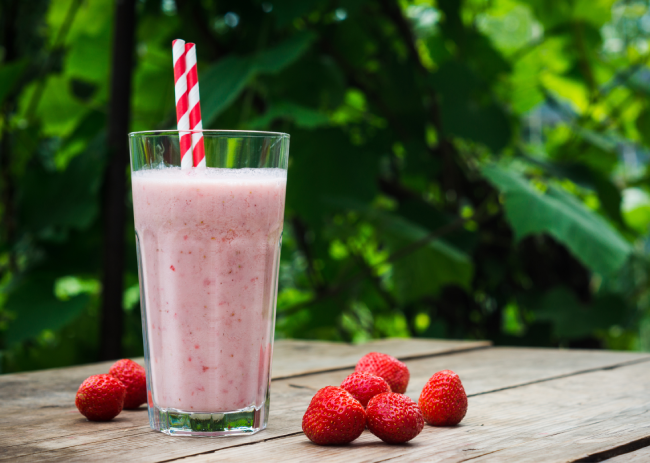
Vegan Strawberry Milk
Ingredients
Ice Cube Coconut Milk:
- 1 400 ml full-fat can of coconut milk Preferably a creamy and thick brand
Strawberry Milk:
- 130 g fresh strawberries measure after slicing into quarters
- 45-60 ml of maple syrup based on how sweet the strawberries are
- ½ tsp vanilla extract
- 8-12 normal-size coconut milk ice cubes prepare as mentioned above
For Garnish (optional):
- Whipped Cream Coconut flavour
- Fresh cut strawberries
- Frozen and crushed strawberries
Instructions
To make the Ice Cube Coconut Milk:
- You may not already have these deliciously flavoured ice cubes ready in your freezer, so start making them. Around 6 hours before actually drinking your milkshake, you should start this process. First, open and mix a whole full-fat can of coconut milk until the texture is smooth and creamy.
- After that, you can begin to transfer this mixture into a blender where you can fully mix it. Besides that, you could also shake it in an air-tight jar. Next, you have to simply pour this mixture into an ice-cube tray and let it freeze.
To make Strawberry Milk:
- In order to make this shake, you will need to add your strawberries, vanilla and maple syrup to a fast blender. You can then blend on high-speed these ingredients until they are totally mixed. You should also ensure that there are no big strawberry pieces bobbing around.
- Switch the blender off and now start working with batches. You can add 2 to 3 coconut milk ice cubes to each batch. Blend each section on a semi-high speed until all of the ice cubes completely melt and mix. You can then keep adding more ice cubes to the mix until you reach a good consistency. Through trial and error, we discovered that 12 ice cubes of 1 ½ tbsp each had the best creamy texture.
- Serve the milkshake immediately. You can also add garnishes of frozen and crushed strawberries. A good topping is a delicious flavoured whipped cream. You can store this mixture in the fridge for around 24 hours. Or you could choose to freeze for a week and get some yummy strawberry ice cream.
Notes
- If you’re going for just 2 servings, you will only require around ½ to ¾ of the 400 ml coconut milk can.
- You can freeze the coconut milk ice cubes and store them for future desserts or cooking sprees.
- Nutritional information is just an estimate of one full-fat cup of coconut milk for two servings.
Danielle is a content writer with a love for books, music, and lifestyle blogs.

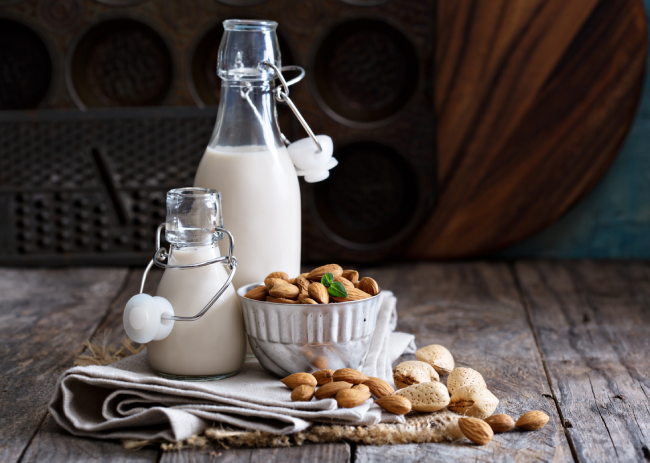


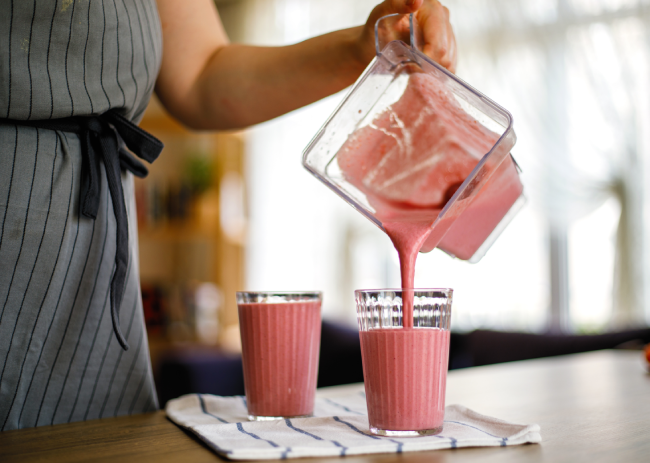
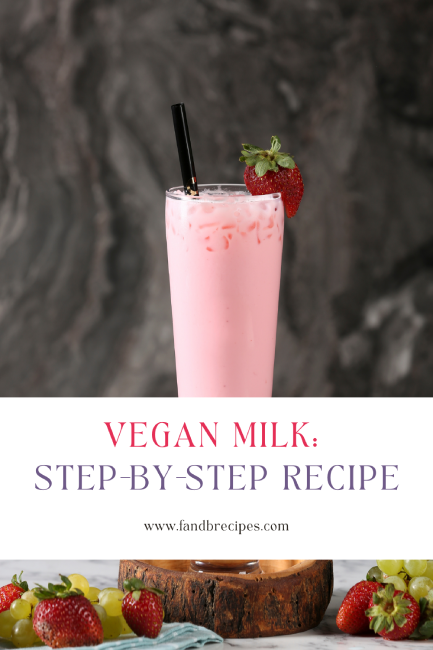
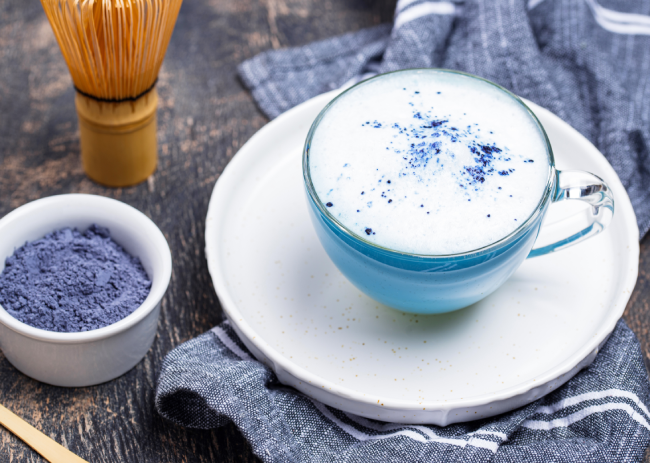
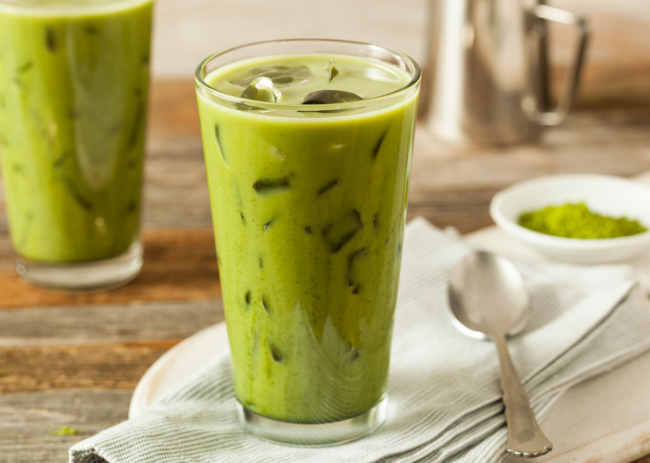
Good 👍
Will surely give it a try
nice to drink look very yum